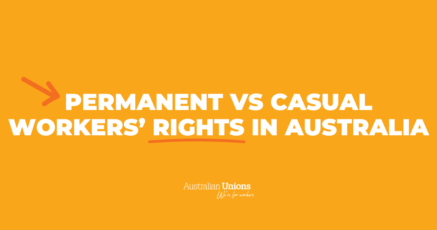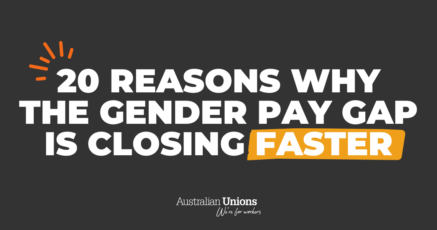The Morrison government has created new laws that take rights away from casual workers and undermine job security for many others.
Strangely called the Fair Work Amendment (Supporting Australia’s Jobs and Economic Recovery) Act 2021, these laws have changed the workplace rights and obligations for casual employees.
Let’s break down what these laws mean for you.
How exactly do these changes affect me?
Well, let’s start with the definition of casual employment.
Under the new laws, employers can now define any vacant job as casual, through individual offers of employment.
If you accept a job classified as casual, you will stay casual even if you later start working a regular pattern of hours with a clear advance committment of ongoing work.
That means fewer rights and leave entitlements and no certainty of hours and pay each week.
But if I’m working a regular pattern of hours, can’t I convert to permanent?
Seems only fair right? But no. Under the new laws, it is now easier for employers to deny casuals the opportunity to convert to permanent work.
They don’t even have to make the offer until you have worked with them for more than 12 months. Even then, you have to have worked a regular pattern of hours for the last 6 of those months.
Oh, and the kicker – they’re not bound to make an offer if they think they have a reasonable excuse for not doing so.
Wait, I just have to hope my boss will convert me out of the goodness of their heart?
Pretty much and if you look at the stats, this seems unlikely.
Since May 2020, 60% of all new jobs have been casualised. That was even before these laws came into effect – you can imagine that number is only going to increase.
Also, if you do meet the requirements for conversion and your employer still doesn’t make the offer, your employer can refuse to let the Fair Work Commission decide whether they were being reasonable. Your only option is to go to the Federal Court. But this can be expensive and it can take a long time to get an answer.
At least I can still get paid more as a casual, right?
Maybe. With 25% hourly loading, some casuals can earn more per hour than part-time or full-time workers.
But, nearly half of all casuals are paid at the minimum award rate where only one in seven permanent full-time workers are on this same rate.
Government statistics say that after the age of 25, casuals actually get paid less than permanent workers in every industry.
And that’s before you take into account the reduced leave entitlements and the uncertainty of hours.
So, whichever way you look at it, casual workers are worse off?
I wish I had a better answer for you, but yes. Once again, the Morrison government has turned on working people in favour of big business.
But this isn’t over. Working people in unions successfully stopped many of the worst aspects of the Morrison government’s proposed changes to our work laws and Australian Unions continue to fight for the rights of casual workers.






SHARE:
Break it down for me: changes to casual work laws